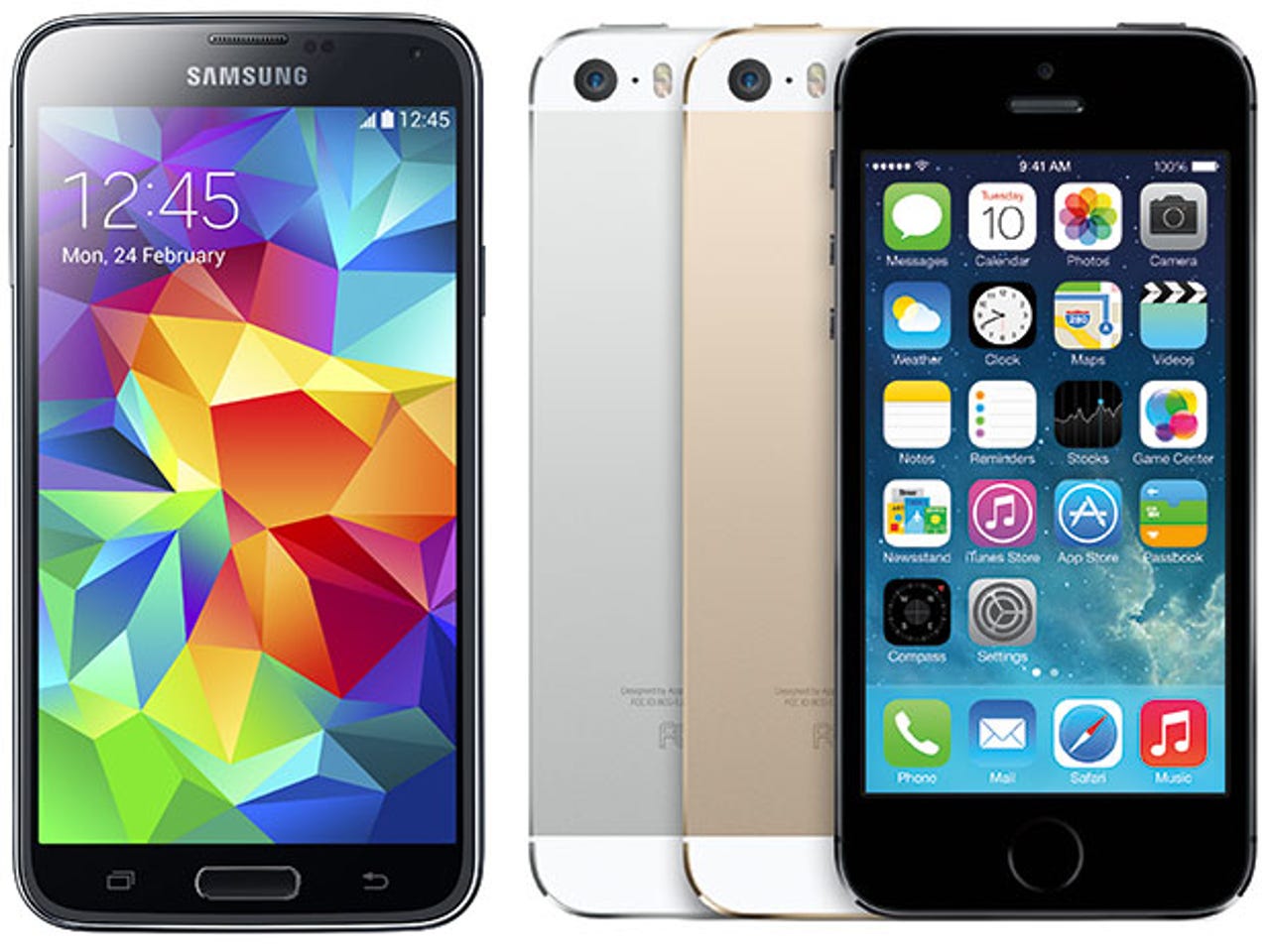Samsung Galaxy S5 vs Apple iPhone 5s: Which has the edge on specs?


Galaxy S5, iPhone 5s — now even the names of Apple and Samsung's flagship devices are converging. How can you tell which of the two devices now has the edge?
The most obvious differences are cosmetic: the Samsung S5 is larger, and has a plastic body; the Apple 5s is smaller, and has a metal band around the edge. But the real differences are what's inside — and what's missing.
Before going any further, it's also worth remembering the iPhone 5s was unveiled back in September while the Galaxy S5 won't be out until April. Six months is a long time in the hyper-accelerated world of smartphone engineering, so it's perhaps not surprising that in some areas the S5's specs beat the iPhone's.
Still, take a look at this non-exhaustive feature comparison between the two phones. You can find more detailed iPhone 5s specs here and more details of the Samsung Galaxy S5 here. I've focused on the elements most likely to interest the average business user.
Samsung Galaxy S5 specs
- Dimensions: 142mm x 72.5 x 8.1mm
- Weight: 145g
- Processor: 2.5GHz quad-core application processor
- Operating system: Android 4.4.2 (KitKat)
- Display: 5.1-inch FHD Super AMOLED (1920 x 1080)
- Memory: 16/32GB microSD slot up to 128GB
- Camera: 16 megapixels (rear), 2 megapixels (front)
- Battery: Removable 2800mAh
- Standby time: 390hrs, talk time: 21hrs
- Wi-fi: 802.11 a/b/g/n/ac HT80, MIMO(2x2)
- Other features: NFC, IP67, Dust and water Resistant, Bluetooth 4.0
- Sensors: Accelerometer, gyro, proximity, compass, barometer, Hall, RGB ambient light, Gesture(IR), Finger Scanner, Heart-rate sensor
Apple iPhone 5S specs
- Dimensions: 123.8mm x 58.6 x 7.6mm
- Weight: 112g
- Processors: A7 chip with 64-bit architecture, M7 motion coprocessor
- Operating system: iOS 7
- Display: 4-inch multitouch display, 1136x640-pixel resolution at 326ppi
- Memory: 16/32GB/64GB
- Camera: eight-megapixel (rear), 1.2 megapixel (front)
- Power: Built-in lithium-ion battery
- Talk time: up to 10 hours on 3G, standby time: up to 250 hours. Internet use: up to 8 hours on 3G, up to 10 hours on LTE, up to 10 hours on wi-fi. Video playback: up to 10 hours, audio playback: up to 40 hours.
- Wi-fi: 802.11a/b/g/n wi-Fi (802.11n 2.4GHz and 5GHz)
- Other features: Siri, Bluetooth 4.0
- Sensors: Gyro, accelerometer, proximity sensor, ambient light sensor, fingerprint identity sensor built into the Home button
What do the specs tell us — and what do they miss?
As you can see from the specs above, the two flagships are unsurprisingly similar in what they offer.
What's more interesting to me is how S5's new features, and those that distinguish it from the 5s, are the things that point the way towards the smartphone battles of tomorrow — around health, wealth, security, and wearables.
The Galaxy S5's support for NFC means it's geared up for one form of mobile payments, something which it already showed an interest in with the S4 but which didn't lead to widespread adoption at the time. That's partly to do with the consumer apathy and partly down to complex web of deals that need to take place before such projects can hit the mainstream.
The iPhone 5s doesn't have NFC — unsurprising given it's classic Apple strategy to wait for a technology to mature before incorporating it. If and when the iPhone adds NFC then you'll know mobile payments is about to hit the prime time. It's also worth noting another important element for building trust around mobile payments is security and identity, so it's interesting that the S5 now includes a fingerprint sensor like the 5s.
The heart rate monitor on the S5 is another reflection of the nascent healthcare market developing around smartphones. It would be wrong to see this as just of interest to urban 'quantified self' freaks, or a gimmick of some kind: with western Europe's ageing population, health monitoring could easily become a major business.
Beyond this, one major point of differentiation between the two flagships is (arguably) Siri, with Apple pushing its digital assistant as a central part of the iPhone experience more than Samsung is with S Voice.
This of course is where comparing devices by specs alone begins to fall short. The smartphone no longer stands alone — think of it as the bright star at the heart of a solar system of apps and devices. As such, it's not just what's inside the box that matters, but whether and how these devices work with the apps and wider services that we need.
What do you think are the key differences between the two? Which do you think has the edge? Let us know in the comments section below.